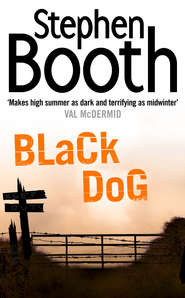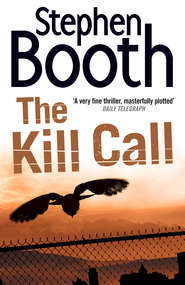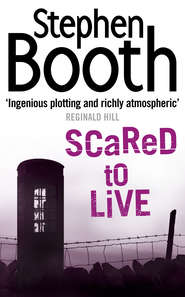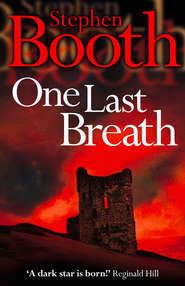По всем вопросам обращайтесь на: info@litportal.ru
(©) 2003-2024.
✖
Cooper and Fry Crime Fiction Series Books 1-3: Black Dog, Dancing With the Virgins, Blood on the Tongue
Автор
Год написания книги
2018
Настройки чтения
Размер шрифта
Высота строк
Поля
She turned at the sound of an engine, and saw a battered blue Transit van struggling up the track. As it reached the gateway, a bent little man in a tweed jacket and a cloth cap got out of the driver’s seat to wrestle with the gate. He, too, took no notice of the geese.
‘I’ll have to leave you to it for a bit,’ said Wilford. ‘I’ve got a customer.’
He walked off, waving to the driver of the van until they had manoeuvred the vehicle against the end of one of the wooden hen huts. Both men went into the hut with bundles of sacks from the van.
‘Stop and have a chat, lass,’ said Sam. ‘It’ll make a change. Wilford can get to be a bit of a boring old bugger after a while.’
‘Have you known Mr Cutts for long?’ she asked.
‘As long as I can remember. Mind you, my memory’s not what it was, so he could be a complete stranger.’
Sam began to laugh, his chest wheezing painfully and his false teeth clicking. Fry winced as he raised a thin hand to straighten his cap and the blade of the knife came dangerously close to his eyes.
‘My family came down from Yorkshire when I was very small,’ he said, when a fit of coughing had passed. ‘We went to live at Eyam. My old dad went to work in the lead mines, and I followed him down there, as lads did in those days. Wilford was the son of one of my dad’s mates. We worked on the picking table together with a few other lads, then moved on to be jig operators. That’s the way it went in those days, you know. You moved in small circles, just a few families and people that you knew. None of this wandering about that everyone seems to do now.’
Fry’s attention strayed around the smallholding, her eyes wide in amazement at the ramshackle constructions and makeshift fencing. She was wondering whether the way the animals were kept was strictly legal. She made a mental note to look up the appropriate regulations when she got back to the station.
‘You’ve been friends an awfully long time then,’ she said vaguely.
‘Sixty years, or a bit more. It was before the war, when we met.’
‘That’d be the Second World War, I suppose.’
Sam peered at her to see if she was making fun of him, but seemed to realize that she was not even born until nearly thirty years after the war was over.
‘Aye, I suppose there have been a few other wars since then,’ he conceded. ‘We joined up together as well, for a bit. Royal Engineers, of course. They were right glad to get miners. They welcomed us with open arms. We went over to France on D-Day and stayed there till the end.’ He chuckled. ‘It brings back a few memories still, does that.’
‘Really?’
‘French tarts,’ said Sam.
‘What?’
The old man chortled. ‘That’s what I remember mostly now. All the rest of it has pretty well gone, all the bad bits. But I remember the tarts in France. We were a long way behind the Front, of course. Rebuilding bridges, that sort of thing. Those French towns and villages were full of girls. And they were right glad to see a few Tommies, I can tell you. We had a high old time. Me and Harry, that was. Wilford didn’t approve, of course.’
‘Harry?’
‘Harry Dickinson,’ said Sam. ‘You might have heard of him. Here’s your mate.’
Fry turned and saw Cooper’s Toyota coming back down the track, turning in by the Nissen hut. He parked behind the Transit and leaned out of the window.
‘There was no one at home up the lane,’ he said.
‘You’re Sergeant Cooper’s lad, aren’t you?’ said Sam.
‘Jesus,’ said Fry.
‘I’m sorry, I don’t think I know you, sir.’
‘Sam Beeley.’
The goat’s bellow was suddenly deafeningly near.
‘She’s out again,’ said Sam. ‘I’ll have to tell Wilford.’
‘What’s the matter with it?’ asked Fry. ‘Is it ill?’
‘In season,’ said Sam, as if they were talking about a vegetable that was sometimes unavailable.
‘Will she be going to the billy, then?’ asked Cooper.
‘She’s off tonight. A bloke up Bamford way is taking her. He has a billy of his own.’
There was a clattering of hooves, and a brown and white head topped by a pair of horns appeared briefly over the roof of the outhouse before the goat dropped nimbly into the paddock and skittered off into the deep grass at the far end.
‘Bugger,’ said Sam. ‘She’ll eat all the cabbages before we can cut them.’
‘Do you want a hand to catch her?’ suggested Cooper, getting out of the Toyota.
‘No, no. We’d never get near her. Wilford will fetch her back – she comes to him. She’s only a goatling, and she’s a bit wild. He calls her Jenny.’
‘Mr Beeley was telling me about when he first met Mr Cutts,’ said Fry, anxious that the interview was drifting far away from her. ‘Their fathers knew each other and they worked together, is that right?’
‘Of course, we all had jobs to go into then,’ said Sam. ‘Local jobs. There were always jobs in the mines then, or the quarries. It’s different for the young ones round here now, I suppose. The lad here will tell you that.’
Fry noticed that Sam didn’t doubt for a moment that she was from out of the area and knew nothing about it, while Ben Cooper would understand. Since she had been in Moorhay, she felt as though her lack of local origins had been pushed into her face, quite unconsciously and without malice, but very effectively. She had been treated politely by people at every property they had visited, but none of them had looked at her with the unspoken recognition and sense of mutual understanding with which they had looked at Ben Cooper when they realized who he was.
‘It’s been different round here for a long time now, Mr Beeley,’ said Cooper.
‘I suppose it has, lad. I suppose it has. But, like I told you, my memory’s not that good. I remember the war, but not much since, if you know what I mean.’
From the hut where Wilford and his visitor had disappeared, a great cacophony of cackling and screeching erupted, accompanied by the flapping of scores of wings.
‘What are they doing in there?’ asked Fry.
‘That bloke with the van is buying some of Wilford’s birds, see,’ said Sam, as if it was perfectly obvious. ‘Wilford left them inside today, those young Marans. But they’re a bit active. It’s better if you can move them at night – they don’t give you as much trouble then.’
‘It sounds horrendous.’
‘They’re good layers, them Marans,’ said Sam.
‘Mr Beeley, did you know Laura Vernon?’
‘I know the family. Comers-in, aren’t they? Half the village seem to be comers-in these days. They’ve only been there a year or two, at the Mount. They walked in the pub one night, you know, when they first arrived. Eh, you should have seen their faces. They never thought they’d be mixing with the hoi polloi like us. But they couldn’t walk straight out again, so they had to sit there and drink their gin and tonics like a right pair of southern pillocks.’
‘They’re from Nottingham, I believe.’
‘Aye.’











